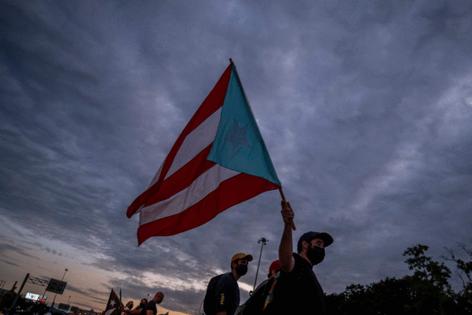Editorial: Statehood for Puerto Rico deserves our respect
Published in Op Eds
Once again, the people of Puerto Rico have voted in favor of becoming the nation’s 51st state. Last week’s vote was the fourth time in the past 12 years that the island’s voters have endorsed statehood, and the victory margin was a clear and convincing 56%.
On the same ballot, Puerto Ricans elected a new governor, Jenniffer González-Colón, who is a pro-statehood leader — and a Republican, too.
Support for statehood on the island has grown over the years, but that’s not the only reason to end Puerto Rico’s second-class status as a U.S. territory (the United States acquired Puerto Rico when the Spanish-American War ended in 1898).
Puerto Rico’s fate remains in the hands of Congress, which has dithered over the question of statehood for far too long.
A political paradox
The Council on Foreign Relations website has called Puerto Rico “a U.S. territory in crisis,” and said, “Puerto Rico is a political paradox: part of the United States but distinct from it, enjoying citizenship but lacking full political representation.”
The residents of Puerto Rico are U.S. citizens, but they cannot vote in U.S. presidential elections; to represent their home, they must leave home and move to the mainland. They are Americans, but they do not benefit from this nation’s prosperity or generosity. It’s time for this unjust paradox to end.
The sweeping re-election of Donald Trump last week should give renewed momentum to the cause of statehood, and it would be a wise political move for Republicans — particularly if they look to states like Florida, where (as we mentioned in Thursday’s editorial) places like Osceola County turned out for Trump largely due to their Puerto Rican populations.
Support from Latino voters in critical battleground states, particularly Pennsylvania, also helps explain Trump’s victory.
Trump and Latinos
Democrats who assumed Puerto Ricans would abandon Trump in droves because a pro-Trump comic callously called the nation “a floating island of garbage” were badly mistaken.
Trump also performed well with Latinos here in Florida, as shown by his success in Miami-Dade and Osceola counties.
Osceola had not voted Republican in a presidential election for the past 20 years — until last week.
Conventional political wisdom has long held that making Puerto Rico the 51st state would favor Democrats, but what happened last week puts that premise in serious doubt. Nationally, a majority of Hispanic men voted for Trump for the first time, according to CNN’s exit polling.
But with Republicans clinching control of the U.S. Senate, the outgoing GOP leader, Sen. Mitch McConnell, R-Kentucky., essentially declared the statehood effort as dead on arrival once again.
“There won’t be any new states admitted that give a partisan advantage to the other side,” McConnell said in an apparent reference to statehood proposals for Puerto Rico and heavily Democratic Washington, D.C. Somebody better show him the numbers on how Puerto Ricans traditionally vote.
Statehood for Puerto Rico would entitle the island to two United States senators, which could shift the partisan balance of the Senate — and if Republicans are the ones who fulfill that long-held justice, they can expect to be rewarded when Puerto Ricans finally get to exercise that voting right. That and economic anxiety over providing much-needed aid for the struggling island are at the root of this chronic inaction in Congress.
Giving Puerto Rico the status of statehood would also entitle that island’s residents to benefits they have been paying for but not receiving. For example, Puerto Ricans pay the same payroll taxes (which support Social Security and Medicare) as mainland Americans. Yet they are shut out of major benefits including Supplemental Security Income, and the Medicare Part D low-income subsidy, a federal program that helps pay for out-of-pocket health care costs. As a result, more than half of Puerto Ricans are forced to rely on Medicaid, but there again the territory receives a fraction of the per-capita funding distributed to residents of U.S. states.
Stalwarts of statehood
Democrats have consistently been the strongest supporters of Puerto Rican statehood in Congress. The latest versions of the bill (S.3231 and H.R. 2757) have languished for nearly two years.
The sponsors are Sen. Martin Heinrich of New Mexico and Rep. Raúl Grijalva of Arizona, and numerous Florida members of Congress in both parties are co-sponsors.
They include Republicans Maria Elvira Salazar of Miami and Bill Posey of Rockledge, and Democrats Debbie Wasserman Schultz of Weston, Frederica Wilson of Miami, Darren Soto and Maxwell Alejandro Frost of Orlando and Kathy Castor of Tampa.
It is morally wrong that the people of Puerto Rico are denied a voice in electing the president of the United States, as well as other rights and privileges that are available to other U.S. citizens. Such territorial colonialism is unbecoming a nation whose founding is rooted in anti-colonial revolution.
The scheme may work for extremely small territories with low populations, such as American holdings in the Pacific, but it’s no way to govern an island that is home to more than three million people.
____
The Orlando Sentinel Editorial Board includes Editor-in-Chief Julie Anderson, Opinion Editor Krys Fluker and Viewpoints Editor Jay Reddick. The Sun Sentinel Editorial Board consists of Editorial Page Editor Steve Bousquet, Deputy Editorial Page Editor Dan Sweeney, editorial writers Pat Beall and Martin Dyckman and Anderson. Send letters to insight@orlandosentinel.com.
©2024 Orlando Sentinel. Visit at orlandosentinel.com. Distributed by Tribune Content Agency, LLC.




























































Comments